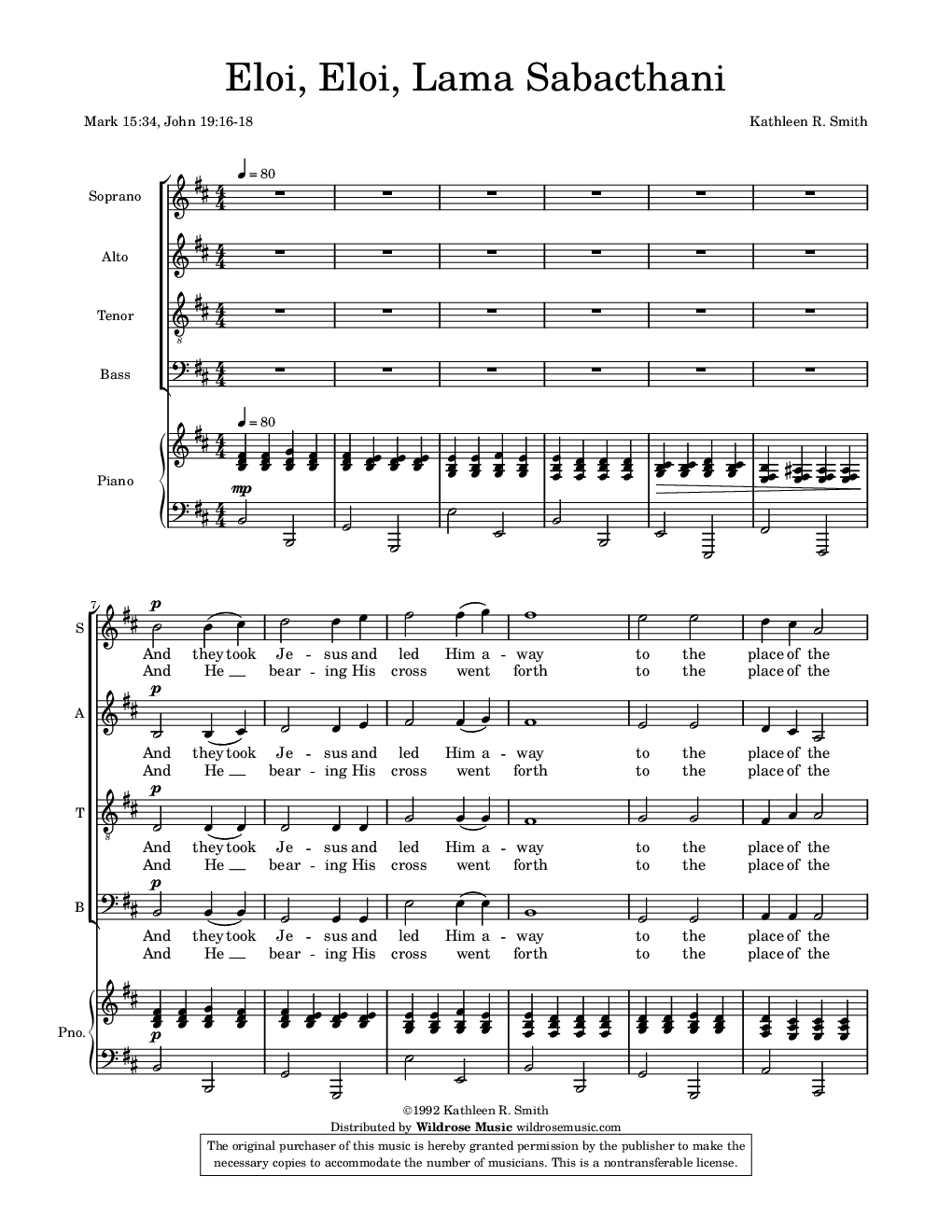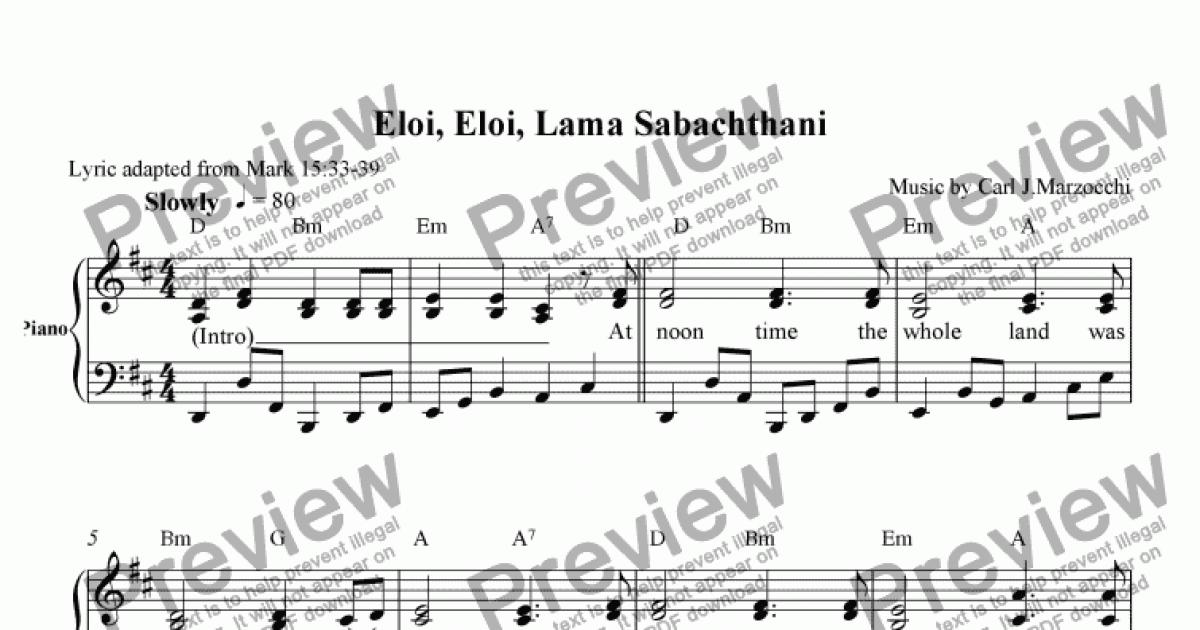
Eloi Eloi Lama Sabachthani Harry Fayt Underwater Photographer
Buy Now NIV, Lucado Encouraging Word Bible, Comfort Print: Holy Bible, New International Version Retail: $54.99 Our Price: $38.49 Save: $16.50 (30%) Buy Now And at three in the afternoon Jesus cried out in a loud voice, "Eloi, Eloi, lema sabachthani?" (which means "My God, my God, why have you forsaken

Eloi, Eloi lema Sabachthani The Soundtrack of Christ's Crucifixion
The forms lema and lama used in Matthew and Mark respectively (Westcott and Hort, The New Testament in Greek) represent the various possible forms, the first the Aramaic, and the second the Hebrew. The various readings and translations of the latter word, sabachthani, only add confusion to an effort at ultimate explanation of the real statement.

Eloi, Eloi, Lama Sabachthani Wildrose Music
It is curious that Matthew transliterated this into the Greek as the Hebrew Eli and Mark transliterated this as Aramaic Eloi. Lama is Hebrew, Lema is Aramaic and is shown as that in both Gospels in the Greek, but translators will render it as lama (Hebrew) for whatever reason.

How to Pronounce Eloi, Eloi, Lama Sabachthani? YouTube
The Death of Jesus (). 33 At noon, darkness came over the whole land until three in the afternoon. 34 And at three in the afternoon Jesus cried out in a loud voice, "Eloi, Eloi, lema sabachthani?" (which means "My God, my God, why have you forsaken me?")[] (35 When some of those standing near heard this, they said, "Listen, he's calling Elijah."

nutsilica Eloi, Eloi, lama sabachthani?
First, when Jesus cried out in a loud voice, 'Eloi, Eloi, lama sabachthani?' many assert that Jesus in His human nature, felt abandoned by God the Father. Jesus was God in the flesh. John 1:14 says, "The Word became flesh and dwelled among us." And in Phil 2:6-7, Paul says that Jesus, "although being in very nature God… was made in human likeness."

How to pronounce Eloi Eloi Lama Sabachthani YouTube
Mark 15:34 — New American Standard Bible: 1995 Update (NASB95) 34 At the ninth hour Jesus cried out with a loud voice, "Eloi, Eloi, lama sabachthani?" which is translated, "My God, My God, why have You forsaken Me?". And at three in the afternoon Jesus cried out in a loud voice, "Eloi, Eloi, lema sabachthani?" (which means "My.

Eloi Eloi Lema Sabachthani Coming Soon Madhu Balakrishnan Baby
A Greater Understanding of What Jesus Meant. "About the ninth hour Jesus cried out in a loud voice, "Eloi, Eloi, lama sabachthani?'-which means, My God, my God, why have you forsaken me?" (Matthew 27:46) This phrase has often been misunderstood because it wasn't just a cry of agony. It was also a cry of victory….

Eloi...Eloi Lama Sabakhtani james celosse (Passover Performance
Expand. Context Summary. Mark 15:33-41 is a raw and stark account of Jesus' death. Jesus feels separated from God and abandoned by His friends. The land is covered by darkness. The earth shakes and the tombs open ( Matthew 27:52-53 ). Only too late does the centurion get a glimpse of what he and his men have done.

O AGUILHÃO DE DEUS Eli Eli Eli Lama Sabachthani? “Eli, Eli” ou “Eloí
Suddenly, Jesus cried out, "'Eli, Eli, lama sabachthani?'". ( Matthew 27:46 ). Matthew and Mark both record versions of these Aramaic words, quoted from Psalm 22:1, along with their clear meaning: "'My God, My God, why have You forsaken Me?'". The words seemed to hang in the air, full of pain, of loss and of isolation.

'Eloi, Eloi, lama sabachthani?” 'My God, my God, why have you forsaken
Matthew 27:46: Around the ninth hour, Jesus shouted in a loud voice, saying "Eli, Eli, lema sabachthani?" which is, "My God, my God, why have you forsaken me?" Mark 15:34: And at the ninth hour, Jesus shouted in a loud voice, "Eloi, Eloi, lama sabachthani?" which is translated, "My God, my God, for what have you forsaken me?" Linguistic analysis

'Eloi, Eloi, Lama Sabachthani' by darkhorse4002 on DeviantArt
34 And at the ninth hour Jesus cried with a loud voice, saying, Eloi, Eloi, lama sabachthani? which is, being interpreted, My God, my God, why hast thou forsaken me? 35 And some of them that stood by, when they heard it, said, Behold, he calleth Elias.

Eloi, Eloi, Lama Sabachthani Download Sheet Music PDF file
Mark 15:34 — New American Standard Bible: 1995 Update (NASB95) 34 At the ninth hour Jesus cried out with a loud voice, "Eloi, Eloi, lama sabachthani?" which is translated, "My God, My God, why have You forsaken Me?". And at the ninth hour Jesus cried with a loud voice, "Eloi, Eloi, lema sabachthani?" which means, "My God, my God.

'Eli Eli Lama Sabachthani' to display in the film fest Malayalam News
Mark 15:34 Audio Crossref Comment Greek Verse (Click for Chapter) New International Version And at three in the afternoon Jesus cried out in a loud voice, "Eloi, Eloi, lema sabachthani?" (which means "My God, my God, why have you forsaken me?"). New Living Translation

“Eli, Eli, Lama Sabachthani?”
ELOI; ELOI; LAMA; SABACHTHA; ELI; ELI; LAMA SABACHTHANI. e'-loi, e-lo'i, la'-ma, sa-bakh-tha'-ni, or (Eloi, eloi, lama sabachthanei): The forms of the first word as translated vary in the two narratives, being in Mark as first above and in Mt as in second reading. With some perversions of form probably from Psalms 22:1 ('eli 'eli lamah.

Eloi, Eloi Lema sabachthani Opiekun Dwutygodnik Diecezji Kaliskiej
Smith's Bible Dictionary. Eli Eli Lama Sabachthani. The Hebrew form, as Eloi, Eloi, etc., is the Syro-Chaldaic (the common language in use by the Jews in the time of Christ) of the first words of the twenty-second Psalm; they mean " My God, my God, why hast thou forsaken me".

“Eloi Eloi, lema sabachthani” Tonya LaLonde
According to a number of sites, including Wikipedia, the saying "Eli, Eli, lama sabachthani" (or in Mark's version "Eloi, Eloi, lama sabachthani") was originally Aramaic: אלהי אלהי למא שבקתני. Courtesy of Wikipedia However, according to some other sites it is Hebrew.